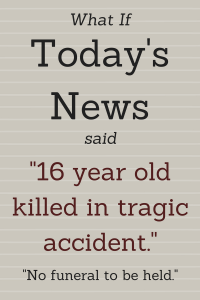 What if today’s headline read, “Man on the verge of discovering a cure for AIDS killed” and no one mourned? Or “16 year old girl killed in tragic accident” and there was no funeral to be held? We would be saddened and dismayed.
What if today’s headline read, “Man on the verge of discovering a cure for AIDS killed” and no one mourned? Or “16 year old girl killed in tragic accident” and there was no funeral to be held? We would be saddened and dismayed.
Yet every day in Dane County, two lives end in abortion, mostly unacknowledged.
In Dane County in the last 20 years, nearly 25,000* lives have been ended without ever taking their first breath. Since the Roe v. Wade decision on January 22, 1973, over 50,000 would-be Dane County residents have not had the opportunity to take their first steps, ride a bike, graduate from high school or land their first job. For perspective, that is roughly equivalent to the combined 2015 populations of Verona, Middleton, Oregon and McFarland.
50,000 lives lost is a sobering number. And yet, even one life lost is a tragedy. One person who might have been the next Martin Luther King, Jr. or a Pulitzer Prize- winning author. She could have been a teacher, a doctor or a loving mother. He could have been your accountant, your mailman or the young father who helps his elderly neighbor shovel snow.
And that 50,000 is actually just the starting point.
Because abortion is not only about lives lost; it’s also about lives irrevocably changed as a result. The tens of thousands of women and men in our community who have experienced the sorrow and grief of an abortion decision, sometimes many years later. While some may be satisfied with their abortion choice, many experience regret and emotional turmoil.
Which is no surprise because abortion is seldom an easy choice. Many women feel they have no options. Too often women feel forced into this decision — sometimes by circumstances, other times by the father of their baby or a family member. She almost always has people telling her what she should do.
At Care Net’s First Care Clinic we listen. We offer a listening ear, pregnancy related medical services and education – all free of charge. Our patients are given an opportunity to complete the Ottawa Decision Guide, an unbiased decision-making tool often used to help evaluate options pertaining to medical care.
We offer support and resources for women who feel there are road blocks in their way to carrying to term including options for health insurance, connections to community resources and even safe housing through The Elizabeth House. In short, she’d have the resources and support that might help her feel abortion wasn’t her only option.
If you or someone you know faces an unintended pregnancy, please reach out to Care Net’s First Care Clinic or another supportive resource in our community. There are people who care and will help every step of the way.
*24,623 from 1996-2015 per Wisconsin Department of Health Services, www.dhs.wisconsin.gov/stats/itop.htm; retrieved 1/13/2017.
A version of this article was published in the Monona/Cottage Grove Herald-Independent.